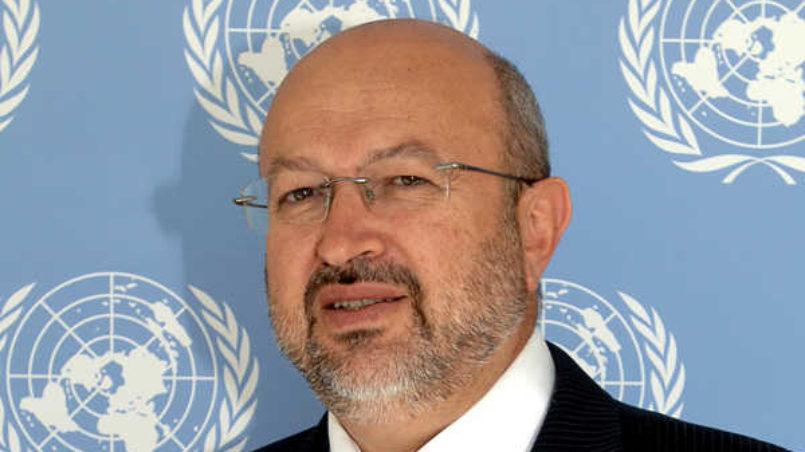DASICON2017 – Introduction and European Security Architecture
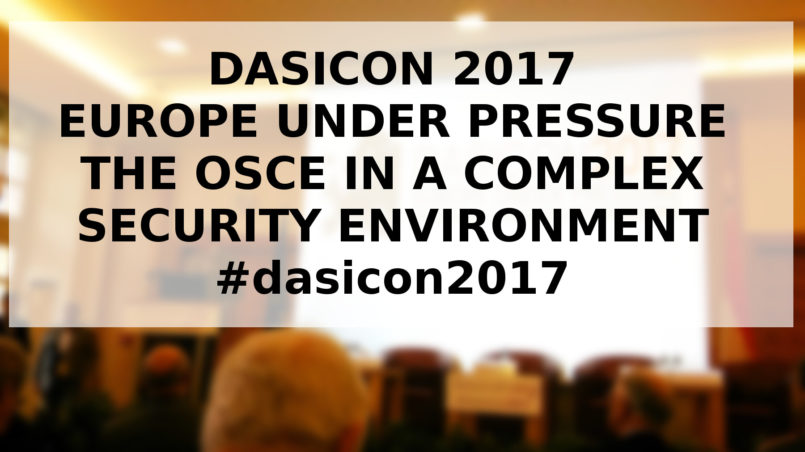
Event data
- Datum
- 3. 3. 2017
- Host
- DASICON
- Location
- Festsaal der diplomatischen Akademie, Favoritenstraße 15a
- Event-type
- Podiumsdiskussion
- Participants
- Jamie Shea, Nato-Mitarbeiter
- Paul Huynen, Botschafter Belgiens bei der OSZE
- Walter Feichtinger, Moderator, hochrangiger österreichischer Offizier
- Lev Voronkov, Professor an der MGIMO Universität, Russland
- Thierry Bechet, Repräsentant der EU bei der OSZE
At the beginning of March, the DASICON2017 conference, which is organised every year by the students of the Diplomatic Academy, took place over two days. In the festival hall, a total of seven panels of eminent experts discussed various issues which, under the conference title, “Europe under Pressure”, examined the diverse challenges for the OSCE of which Austria holds the chairmanship in 2017.
In his opening statement, the head of DASICON2017, Hannes Pirker, pointed out that the voluntary donations of the audience would go to the Zaatari refugee camp.
Clemens Koja, permanent representative of Austria to the OSCE, considers that the role of Austria’s chairmanship should be to promote dialogue with everyone: Austria should act as a bridge builder and an honest intermediary. For the youth, who should be a focus of attention, workshops will be organised. In the battle against radicalisation, new measures will be implemented. Of paramount importance is the restoring of trust between members who have suffered as a result of the events of the last few years (Syria, the Ukraine).
General Secretary, Lamberto Zannier, who worked together with the UNO General Secretary, Ban Ki Moon, years ago in Kosovo, sees complex challenges for the OSCE as regards the current security sitaution. Since the end of the Cold War, the OSCE has again become more active – simply because there was nobody else who dealt with the conflicts.
The OSCE has the benefit of being able to act flexibly in this complex situation, e.g. within the security days, a regularly occurring panel discussion with eminent experts participating. However, not only here was the mistrust evident, above all due to the situation in the Ukraine. Because of this, it was difficult to reach a consensus. Perhaps the lost trust can be won again by means of special missions such as those in the Ukraine: two teams, each with four people from different nations, work successfully there together.
The most important people who are seeking solutions to the existing conflicts are, according to Zannier, those who work and live at the location concerned e.g. mayors and administrative personnel. Attempts are being made to form close ties with these people. On a national level, attempts have to be made to create connections between the different levels e.g. by the OSCE offering platforms for discussion. Last year the individual countries showed little interest in getting to know more about the subject of migration. Zannier, however, referred to this topic as it influences the reality of many people and cannot be ignored.
Panel 1: The OSCE in the European Security Architecture
At the beginning, moderator Walter Feichtinger rightly posed the question: Does something like a European security architecture even exist? Four organisations exist next to each other (NATO, the EU, the Council of Europe, the OSCE) which oscillate between cooperation and competition. Are they capable of solving problems or are THEY the problem?
Paul Huynen, permanent representative of Belgium to the OSCE, considers there to be seven points which together make the OSCE special:
- It has 57 members, its concept is entitled, “from Vancouver to Vladivostok”.
- Security should be achieved by means of cooperation for it is indivisible.
- The OSCE is involved in the entire conflict cycle, beginning with the avoidance of the conflict until follow-up support.
- All decisions are made politically and not legally.
- Consensual decisions between equal ranking partners are striven for.
- The basis of the organisation are the norms and values which were laid down in 1975 in the Helsinki Accords.
- And finally the OSCE undertakes important field missions. For example, in the Ukraine it is the only international organisation on site. It also appears time and again when elections are being controlled.
According to Huynen, the OSCE has yielded positive results – although, with 57 states, there are just as many opinions as to whether and to what extent the organisation is in fact successful.
According to Thierry Bechet, permanent representative of the EU in the OSCE, the European Union was established in the 1950s mainly due to security reasons. A differentiation has to be made between soft (diplomacy) and hard security (military). The security between nations is just as important as that within a state. The expectations of the OSCE are completely disproportionate to their financial and personnel resources, which Bechet termed “pathetic”.
Jamie Shae NATO Deputy Assistant Secretary General for Emerging Security Challenges, in principle supports soft security but – if necessary – also the hard option. Time and again he is surprised by the constant moaning for he describes the current security system as the “best ever” with the smallest number of weapons when one considers the disarmament of the Americans since the end of the Cold War and the reduction of nuclear weapons. The membership of various organisations is important for the countries. Russia has never before been so closely involved (at least until before the crisis in the Ukraine).
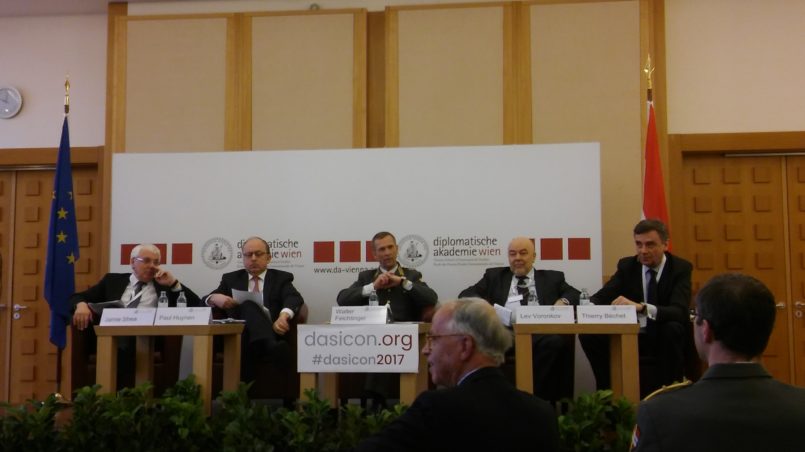
In Eastern Europe, the security concept also has to be implemented although with much fewer units than in the the time of the Cold War (e.g. 87 instead of 2,500 tanks). The help for fragile states on the periphery of Europe brings security, also for NATO. And countries would have the right to choose the security concept that they want. Personal note: If Mexico had joined the Komintern, the west would hardly have been able to approve this free voting right. By the same token, numerous (illegal) interventions by the USA in communist Cuba can be proven.
According to Shae, Russia has to be part of the European security organisation. The objective is deescalation – both sides are not interested in a new arms race. Direct channels of communication have to be re-established as well as joint meetings and discussions on the global situation in order to re-build the lost trust on both sides.
Prof. Lev Voronkov sees in NATO’s unilateral offer at the Budapest Memorandum on Security Assurances in 1994 to enable all former eastern bloc states to join NATO a fundamental potential for conflict with Russia considering that, after the unification of Germany, an expansion of NATO to the east was ruled out. In Partnership for Peace there are various levels of cooperation for the participating states, from full membership to pure cooperation. Voronkov questions how the 35 OSCE members could rise to 57: this came about above all due to the the break-up of Yugoslavia and the Soviet Union. Is the often propogated concept of territorial integrity really a basic pillar of the OSCE concept or is it merely a fig leaf?
To the question from ORF correspondent Christian Wehrschütz as to whether Russia still considers itself to be a part of Europe, the Russian professor replied that Russia of course is striving for cooperation with Europe – but on the same level. The Council of Europe cancelled its invitation to Russia. A Russian OSCE delegation wanted to travel to Finland and was denied entry due to pressure from the EU. The cooperation with Russia, announced by the EU in 1999, was again revoked by the EU. Similar has occured in NATO.
The Ukraine Resolution of the OSCE was, according to Huynen, passed with a 56:1 vote and thereby with a clear majority.
Credits
| Image | Title | Author | License |
|---|---|---|---|
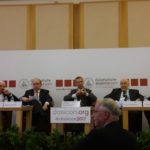 |
Dasicon2017 – Panel 1 | Christian Janisch | CC BY-SA 4.0 |
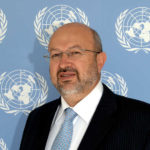 |
OSCE General Secretary Lamberto Zannier | Marc Perrin de Brichambaut | CC BY-SA 3.0 |
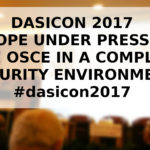 |
Opening | Christian Janisch | CC BY-SA 4.0 |

